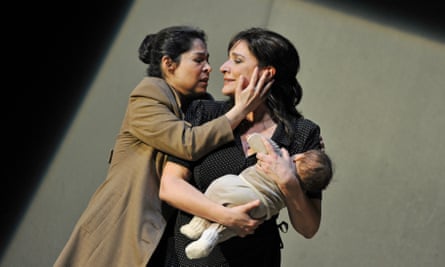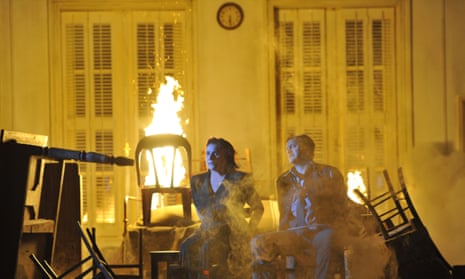The first glimpse of Cecilia Bartoli’s Norma with her back to us, hunched over a desk, scribbling away, seems a quaint tantaliser given the whole night is built to showcase La Bartoli and La Bartoli alone. Bellini’s bel canto masterpiece has long been a playground for divas; powerhouse sopranos of the 20th century (Callas, Caballe, Sutherland) made the title role various degrees of their own. Now it’s the turn of Bartoli – that supremely fiery and coquettish Italian mezzo who conceived this production for the Salzburg Whitsun festival of which she is artistic director – who unquestionably owns the stage from modest opening image to ecstatically intense final immolation.
The difference is, she’s not a soprano. Bartoli’s argument is that in the 1830s, when Norma was composed, there was less distinction between voice types – and anyway, the original Norma was Giuditta Pasta, who also sang Tancredi and Cenerentola and other mezzo roles. Is it a big deal? Depends who you ask. Bartoli’s voice is certainly darker and less powerful than “definitive” Normas, with some awkward corners, and her Casta Diva is careful and simmering rather than unbound and radiant. There’s also the age factor – a wear to her 50-year-old voice that caused some smirks in the audience but which I found incredibly poignant. Norma’s lover goes off with a younger woman and Bartoli makes the hurt inescapably palpable.

Hers is a performance of big poses and passionate fury, and the unmitigated drama is a thrill if you just sign up and go. Directors Moshe Leiser and Patrice Caurier set the production during the second world war, where the druid priestess becomes a French resistance leader and her Roman occupiers are Nazis. The updating is a bit clunky when it comes to the libretto’s religious fervour – are the resistance fighters really praying to a pagan bible? – but the premise works: Norma sleeps with the enemy and is torn apart by shame. And although the rest of the cast has been chosen as domestiques to Bartoli’s lead, there are endearing performances from John Osborn as Pollione – in excellently fluid voice though without much emotional heft – and Rebeca Olvera as the graceful and improbably chaste Adalgisa. Gianluca Capuano stepped in to conduct at the last minute, and I enjoyed the urgent, pacy playing he got from the period-instrument ensemble I Barocchisti – all a bit raucous and messy, more romp than polish. I suspect I had more fun than I was supposed to at this Norma.

So Bartoli provided the star factor of Edinburgh international festival’s opening night. But there were bigger voices – huge voices – at the Queen’s Hall the next morning, where tenor Stuart Skelton blazed and bellowed through Mahler’s Das Lied von der Erde with Richard Tognetti’s Australian Chamber Orchestra and mezzo Alice Coote providing supple, glimmering foils. This was Schoenberg’s small-scale arrangement, but Skelton went all-out regardless. The EIF morning series has a tendency for anodyne politeness, but not this time. The noisy abandon bodes well.
- Norma is at Festival theatre, Edinburgh, until 9 August. Box office: 0131-473 2000.

Comments (…)
Sign in or create your Guardian account to join the discussion